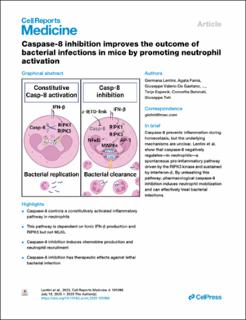Caspase-8 inhibition improves the outcome of bacterial infections in mice by promoting neutrophil activation
Lentini, Germana; Famà, Agata; De Gaetano, Giuseppe Valerio; Coppolino, Francesco; Mahjoub, Ahlem Khachroub; Ryan, Liv; Lien, Egil; Espevik, Terje; Beninati, Concetta; Teti, Giuseppe
Peer reviewed, Journal article
Published version
Permanent lenke
https://hdl.handle.net/11250/3106613Utgivelsesdato
2023Metadata
Vis full innførselSamlinger
Sammendrag
During differentiation, neutrophils undergo a spontaneous pro-inflammatory program that is hypothesized here to be under caspase-8 control. In mice, intraperitoneal administration of the caspase-8 inhibitor z-IETD-fmk is sufficient to unleash the production of pro-inflammatory cytokines and neutrophil influx in the absence of cell death. These effects are due to selective inhibition of caspase-8 and require tonic interferon-β (IFN-β) production and RIPK3 but not MLKL, the essential downstream executioner of necroptotic cell death. In vitro, stimulation with z-IETD-fmk is sufficient to induce significant cytokine production in murine neutrophils but not in macrophages. Therapeutic administration of z-IETD-fmk improves clinical outcome in models of lethal bacterial peritonitis and pneumonia by augmenting cytokine release, neutrophil influx, and bacterial clearance. Moreover, the inhibitor protects mice against high-dose endotoxin shock. Collectively, our data unveil a RIPK3- and IFN-β-dependent pathway that is constitutively activated in neutrophils and can be harnessed therapeutically using caspase-8 inhibition.

